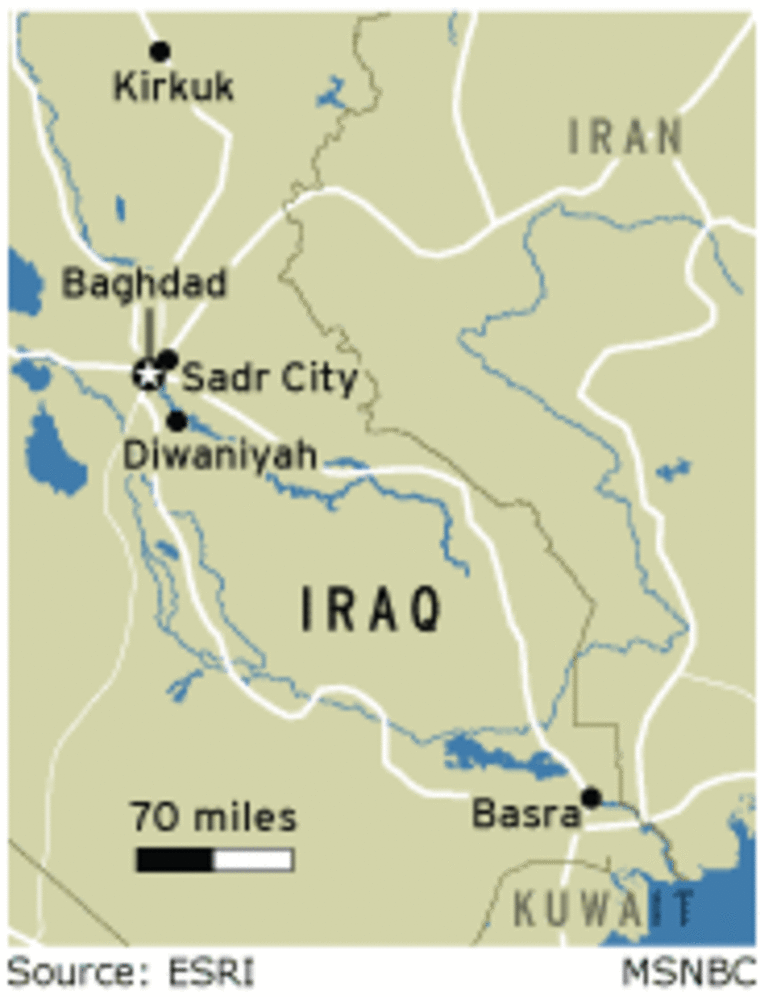Fifty gunmen and 20 Iraqi soldiers have been killed in clashes in the town of Diwaniyah south of Baghdad, the Ministry of Defense spokesman said on Monday.
Mohammed al-Askari said the fighting started on Sunday evening when the gunmen attacked police stations and army troops were sent in as reinforcements and eventually took control on Monday.
Iraqi army, police and hospital sources said earlier that the clashes were between militiamen loyal to radical Shiite cleric Muqtada al-Sadr and Iraqi troops. A spokesman in Sadr's local office said only two of his militiamen were killed.
The clashes were the most violent in two days of bloodshed across the country, from the northern city of Kirkuk to Baghdad and Basra in the south.
The dead included eight American soldiers, one of the U.S. military’s deadliest weekends in months.
Baghdad violence drops
Despite the weekend spike, violence in Baghdad has dropped by nearly half since July, when U.S.-led forces launched an operation to pacify the capital, a U.S. general said Monday.
U.S. military spokesman Major General William Caldwell also said Prime Minister Nouri al-Maliki would assume operational control of Iraq’s armed forces by next month in what he called a significant step toward Iraq taking responsibility for its security.
Caldwell hinted at a looming confrontation between U.S. and Iraqi forces and al Sadr's militia, whose Sadr City slum stronghold has not yet been targeted in Operation Together Forward.
“The intention is for Iraqi security forces to operate through the entire city of Baghdad,” Caldwell told journalists.
Sadr City is largely a no-go area for the Iraqi security forces and even U.S. troops’ few forays there have resulted in fierce gunbattles with militiamen. Analysts say the continued existence of the militias poses a threat to Iraq’s stability.

Caldwell said troops had cleared 33,000 buildings, seized more than 700 weapons and detained 70 suspects during the three-week-old operation to quell violence in Baghdad.
The daily murder rate had dropped 46 percent from July to August and car bombings were at their lowest rate for eight months, he said, while noting a spate of car bombings and shootings at the weekend which killed dozens.
“Insurgents and terrorists are hitting back in an attempt to offset the success of the Iraqi government and its security forces and divert media attention from Operation Together Forward,” he said.
‘High alert’
The fighting in Diwaniyah broke out late Sunday night when Iraqi soldiers conducted raids in three neighborhoods to flush out the militiamen and seize weapons, said army Capt. Fatik Aied.
He said the fighting continued Monday.
The al-Sadr representative in Diwaniyah, Sheik Abdul-Razaq al-Nidawi, told The Associated Press that “the Iraqi army pulled out of Diwaniyah and the Mahdi army is in state of high alert.”
Diwaniyah, 80 miles south of Baghdad, is a Shiite-dominated city where the influence of the Mahdi Army has been gradually increasing. It already runs a virtual parallel government in Sadr City, a slum in eastern Baghdad.
Al-Sadr's clout
The government of al-Maliki, a Shiite, has found it difficult to rein in al-Sadr, whose movement holds 30 of the 275 seats in parliament and five Cabinet posts.
Al-Sadr’s backing helped al-Maliki win the top job during painstaking negotiations within the Shiite alliance that led to the ouster of Prime Minister Ibrahim al-Jaafari.
Al-Sadr mounted two major uprisings against the American-led coalition in 2004 after U.S. authorities closed his newspaper and pushed an Iraqi judge into issuing an arrest warrant against him.
American forces have been wary of confronting the Mahdi Army because of al-Sadr’s clout and his large following among Iraq’s Shiite majority.
Some 10,000 Iraqis have been killed in the last four months in unrelenting attacks by Sunni and Shiite extremists on each other’s communities, as well as bombings and shootings by Sunni Arab insurgents.
In other incidents, a suicide car bomber slammed into a police checkpoint outside the Interior Ministry in Baghdad on Monday.
The blast, heard a mile away, killed 16 people, including 10 policemen, police 1st Lt. Ahmed Mohammed Ali said. He said 18 policemen were among the 47 people wounded.
Elsewhere in the capital, a roadside bomb in the mainly Sunni western neighborhood of Jihad struck a car transporting five barbershop workers, killing one person and seriously wounding four, police Lt. Maitham Abdul-Razzaq said.